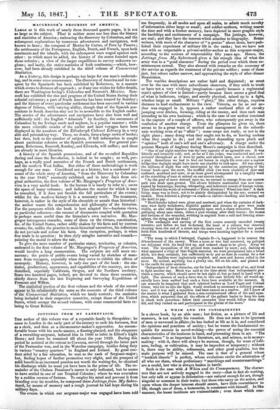MACGREGOR'S PROGRESS OF AMERICA.
LARGE as is this work of nearly three thousand quarto pages, it is not SO large as the subject. That is neither more nor less than the history and statistics of America ; embracing the discovery by Columbus, and the subsequent explorations by numerous adventurers and navigators, well known to fame ; the conquest of Mexico by Cortes, of Peru by Pizarro ; the settlements of the Portuguese, English, Dutch, and French, upon both continents and the islands, with the subsequent wars waged against each other : to which must be added, the history of the states founded upon those colonies; a view of the larger expeditions to survey unknown re- gions; - and lastly, the entire statistics of both continents,—which, how- ever, had been already exhibited in the third volume of Commercial Statistics.
As a history, this design is perhaps too large for one man's undertak- ing, and in some sense unnecessary. The discovery of America and its con- quest by the Spaniards has been exhibited by Robertson, in a manner .which seems to distance all approach ; or if any one wishes for fuller details, there are Washington Irving's Columbus and Prescott's Mexico. Ban- croft has exhibited the rise and progress of the United States during their colonial existence a part of South America has been treated by Southey; and the history oievery particular settlement has been narrated in various degrees of fulness, with varying ability, though that of the Spanish pos- sessions in South America may not be so accessible to the English reader. The stories of the adventurers and navigators have also been well and sufficiently told : the English "Admirals" by Southey, the successors of Columbus by the Irvings uncle and nephew, in a popular manner ; while the more scientific results of the earlier and later voyages have been displayed in the numbers of the Edinburgh Cabinet Library in a very able and painstaking way. These, no doubt, form a large series of books ; but then, look to the number of subjects, if full information is sought about particular colonies or the Spanish possessions. For general pur- poses, Robertson, Bancroft, Southey, and Edwards, will suffice; and these are already in most libraries.
A history of the Spanish possessions and of the so-called Republics during and since the Revolution, is indeed to be sought ; as well, per- haps, as a really good narrative of the French and Dutch settlements, and the modern West Indies. But either of these undertakings is work enough for one man. Considered not as a history, but a condensed ac- count of the whole story of America, "from the Discovery by Columbus to the year 1846," succinctly exhibited, and in later days from ori- ginal authorities, the first volume of Mr. Macgregor's Progress of Ame- rica is a very useful book. In the bureau it is handy to refer to ; saves the space of many volumes; and indicates the matter for which it may be consulted, if it does not furnish the full particulars of the events.; whilst for the modern history it is a necessary work. The treatment, however, is rather in the style of the chronicle or annals than historical : the author wants the comprehension and philosophy of the historian. For the purposes which the book is best adapted for—business views, or particular reference—the resume of documents coupled with quotation Is perhaps more useful than the historian's own narrative. Mr. Mac- gregor intersperses remarks, some of them on the virtues, constitution, &c. of the United States, rather oddly shaken by his facts and by current events; for, unlike the practice in most historical narratives, his reflections do not pervade and colour his facts. One exception, perhaps, is when free trade is in question : he then slyly mingles narrative and remark— pointing the moral to adorn the tale.
To give the mere number of particular states, territories, or colonies, embraced in the first volume of Mr. Macgregor's Progress of America, would involve a long enumeration. The subjects are still more nu- merous; the precis of public events being varied by sketches of man- ners from voyagers, especially when they serve to exhibit the effects of monopoly. History, however, is only one part of the book : the sta- tistics productions, appearance, and capabilities of the country, are also described, especially California, Oregon, and the Northern territory. Some two hundred pages, indeed, are devoted to these three countries, chiefly drawn from the late Exploring and Surveying Expeditions of Fremont and Wilkes.
The statistical portion of the first volume and the whole of the second appear to be substantially the same as the contents of the third volume of the Commercial Statistics, which we lately noticed ; the statistics being included in their respective countries, except those of the United States, which occupy the second volume, with some commercial facts re- lating to Great Britain.


























 Previous page
Previous page